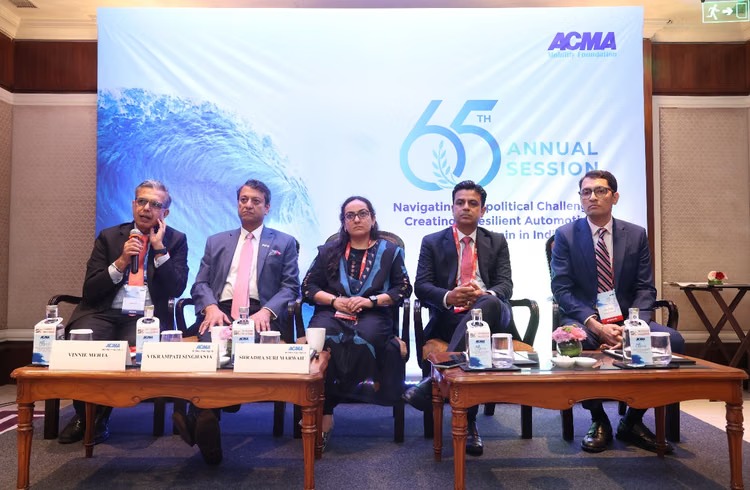
ACMA’s 65th Annual Session highlights Supply Chain Resilience amid global shifts
NEW DELHI : The Automotive Component Manufacturers Association of India (ACMA) held its 65th Annual Session in New Delhi, focusing on building resilient automotive supply chains amid evolving geopolitical challenges. The event brought together over 1,200 delegates, including senior government officials, industry executives, and international stakeholders.
The session featured participation from key government ministers including Shri Nitin Gadkari (Road Transport & Highways), H.D. Kumaraswamy (Heavy Industries & Steel), and Shri Piyush Goyal (Commerce & Industry), alongside European Commissioner for Trade and Economic Security Maroš Šefčovič.
ACMA President Shradha Suri Marwah highlighted the industry’s growth trajectory, noting that India’s auto component sector expanded beyond $80 billion in FY25, with exports exceeding $23 billion. She emphasized the sector’s evolution into a trusted global partner despite facing various market challenges.
A significant highlight was the release of the ACMA-McKinsey Study projecting the industry to reach $200 billion by 2030. The study identified growth drivers including robust domestic demand, expanding export opportunities, and emerging opportunities in electric vehicle components and connected solutions. However, it also flagged potential risks from trade tariffs, carbon taxes, and import dependencies on rare earth materials and semiconductors.
Minister H.D. Kumaraswamy outlined government policy support, citing the Production Linked Incentive (PLI) scheme’s success in attracting over ₹29,500 crore in investments and creating more than 45,000 jobs. He also referenced the PM-eDRIVE programme’s role in promoting electric mobility across various vehicle segments.
The discussions addressed strategies for supply chain diversification, technology localization, and competitiveness enhancement. Industry representatives from companies including Sona Comstar, Switch Mobility, Volkswagen Group India, Hero MotoCorp, and Bosch India participated in panel discussions exploring these themes.
Minister Nitin Gadkari articulated the government’s vision to establish India as a global hub for smart, sustainable, and affordable mobility by 2030. He emphasized the role of clean fuel adoption including electricity, ethanol, hydrogen, and biofuels in achieving this objective.
Commerce Minister Piyush Goyal highlighted ongoing India-EU trade negotiations and announced the reduction of GST on auto parts to 18 percent as a measure to formalize supply chains and support sector growth.
European Commissioner Šefčovič emphasized the potential for enhanced India-EU collaboration, noting existing trade worth $140 billion and the opportunity to combine European technology expertise with Indian manufacturing capabilities.
The session underscored India’s growing significance in global automotive supply chains and the industry’s focus on building resilience against geopolitical uncertainties while pursuing growth opportunities in traditional and emerging vehicle technologies.

